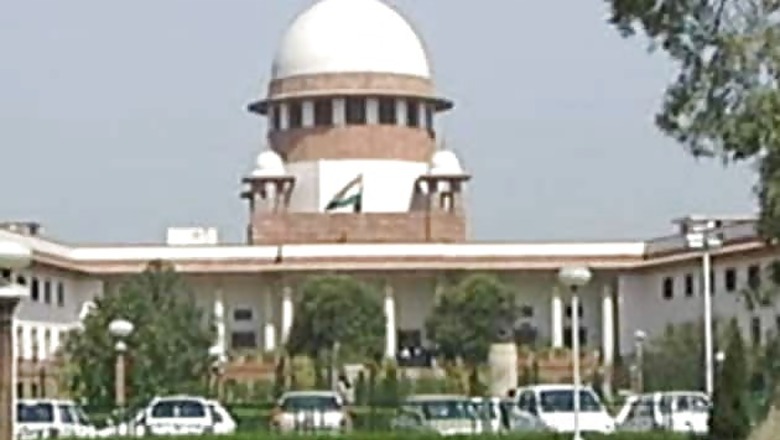
views
The Supreme Court will on Tuesday hear a batch of petitions, including the one filed by social worker like Aruna Roy against the implementation of the Aadhar scheme or the "Unique Identification Number" System (UID), by linking it to various welfare schemes.
The petition of Roy and others came up before a bench comprising Justices BS Chauhan and SA Bobde which said it will be heard along with the applications filed by the Centre and the three oil PSUs seeking modification of its earlier order that Aadhar card is not mandatory and no person should suffer for want of it in getting benefits of government schemes. "...the enrolment under the UIDAI scheme is purportedly voluntary - yet many welfare schemes of the State seem to mandate the need for an Aadhar number to access those schemes - effectively making Aadhar enrolment compulsory," the petition filed by social workers said.
The petition also said the manner in which the biometric details of the citizens are collected by private contractors and NGOs hired by UIDAI without any safeguard makes it prone to misuse not only by private actors but also by the State.
"In the present day and age, where every country is facing the problem of identity frauds, usage of fake identities for money laundering, terrorism, etc., UID is letting private contractors collect sensitive data of persons, which is not protected or governed under any law, whatsoever. The petitioners also claimed there is an empirical research to show that the biometric identification denoted for UID, namely the Iris Scan and finger print Identification, is faulty and capable of misuse.
"Without a statutory framework determining accountability, data-protection, offences for violation etc., UID is putting in jeopardy not only life and rights of people but also security of our country," the petitioners said.
The petition also said the scheme violates the fundamental rights of the citizens and the government is practically making it mandatory for seeking benefits under various welfare schemes such as PDS, MNREGA, pensions, scholarships, Janani Suraksha Yojana and LPG connections meant for economically weaker sections whose lives and livelihood depend on such schemes.
Those who do not manage to enroll are ultimately excluded and since it involves dependency on machines, any technical failure would mean delay with no alternative, it said.
It also said though UIDAI claims that persons with no document to prove their identity can be introduced by other individuals with UID who can certify their identity "it is not as simple as it sounds and give rises to various security risks and the possibility of fake identities, which can compromise national security."
"Though the State claims the enrollment for the UID number is demand-driven and on a voluntary basis, the harsh disqualifications for non-enrollment virtually makes obtaining a UID number compulsory. As a commentator pointed out, the present UID system is like selling bottled water in a village after poisoning the other available drinking water and claiming people are buying water voluntarily," it said.
The petition said implementing the UID system in its present form amounts to direct infringement on fundamental rights of the citizens because of the lack of data protection.
It also said it violates the right of equality before law and protection of life and personal liberty as by linking UID with other social welfare benefit schemes, persons who are currently benefiting under such existing welfare schemes, run the risk of being arbitrarily excluded. "...such, high-handed and casual action of the State, wherein its citizenry are deprived of their fundamental rights, stands in violation of the Constitution - both in letter and in spirit.
There is no justification for the casual implementation of such a scheme without providing adequate legislative safeguards."
It said the UIDAI had itself acknowledged, in its strategic overview document, the need for legal framework and the privacy and security risks UIDAI is facing and the National Identification Authority of India Bill was also rejected by the Parliamentary Standing Committee in 2011.
"Given that the UIDAI has admitted to the above flaws in the project and given the fact that they have not been addressed effectively till date, utmost caution and restraint should have been exercised while further implementing the scheme. "However, without providing any statutory or legal framework or addressing any of the security risks involved, the government is implementing the UID project at the cost of the tax-payers' money."
Earlier, the Supreme Court had said that the Aadhar card, being issued by Unique Identification Authority of India (UIDAI), was not mandatory for availing any government services and nobody should be deprived of any such facilites for want of the card.
It had asked the Centre not to issue it to illegal immigrants as it would legitimise their stay. The apex court had passed the earlier order while hearing a batch of pleas against the decisions of some states to make Aadhar cards compulsory for a range of activities including salary, PF disbursals and marriage and property registrations. After this, the Centre had moved the court seeking modification of the order.
IOCL, BPCL and HPCL had also approached the court speaking about "serious doubts, confusion and uncertainty" in the minds of citizens who have already enrolled for Aadhaar card to avail Direct Benefit Transfer for Liquefied Petroleum Gas Consumers (DBTL) scheme to get subsidised LPG cylinders.



















Comments
0 comment